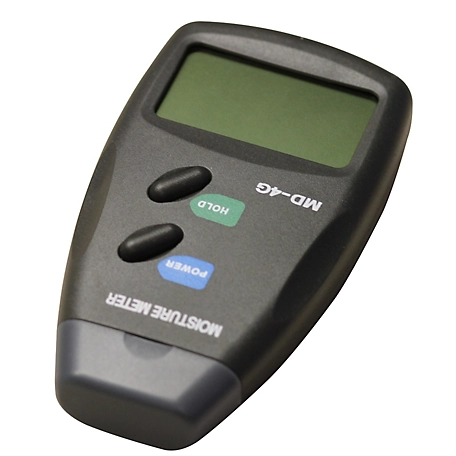The Ultimate Overview to Selecting the Right Moisture Meter for Your Demands
The Ultimate Overview to Selecting the Right Moisture Meter for Your Demands
Blog Article
The Ultimate Guide to Dampness Meters: A Comprehensive Introduction and Just How They Can Save You Cash
Dampness meters serve as indispensable tools in detecting and monitoring moisture content in products, assisting in preventing expensive problems and ensuring the high quality of items. Recognizing the nuances of different types of dampness meters, their applications, and the prospective cost-saving benefits they use can be a game-changer for businesses and professionals alike.
Types of Wetness Meters
Numerous kinds of moisture meters are available for different applications in numerous sectors. One usual type is the pin-type moisture meter, which measures the electrical resistance between two pins put into a material. This kind is ideal for timber, drywall, and other structure products. Pinless wetness meters, on the various other hand, usage electromagnetic sensing unit plates to scan a bigger area without triggering damages to the product's surface. Moisture Meter. These meters are excellent for promptly analyzing dampness levels in huge locations such as wall surfaces and floors.

Infrared wetness meters gauge the thermal homes of a product to determine its dampness content non-invasively, making them useful for applications where pin or pinless meters might not be appropriate. Recognizing the different types of moisture meters available can aid markets pick the most appropriate tool for their certain wetness dimension demands.

Advantages of Using Dampness Meters
Wetness meters supply indispensable benefits in precisely checking and assessing dampness degrees in varied materials and atmospheres (Moisture Meter). Among the main advantages of making use of moisture meters is the prevention of potential damage brought on by excess wetness. By finding and dealing with high wetness levels beforehand, dampness meters help to avoid mold development, rot, and architectural damages in structures, saving both time and cash on fixings. Additionally, wetness meters aid in making certain the high quality of products throughout construction or production procedures. By precisely determining moisture web content, these devices help preserve the integrity of wood, drywall, concrete, and other materials, decreasing the risk of failings or issues.
Furthermore, making use of moisture meters can lead to boosted energy effectiveness. In farming settings, moisture meters play a crucial duty in optimizing crop returns by enabling farmers to keep an eye on dirt moisture degrees and make educated irrigation decisions.
Just How to Pick the Right Moisture Meter
When picking a dampness meter, it's crucial to make certain that the meter is ideal for the certain material you will certainly be screening. Different products have varying electric residential properties that can impact moisture analyses, so choosing a meter designed for your product is important for accurate outcomes. By carefully examining these elements, you can pick a wetness meter that meets your requirements and provides exact wetness measurements for your jobs.
Proper Methods for Moisture Meter Use

Expense Cost Savings With Dampness Meter Applications
Exactly how can the calculated usage of dampness meters lead to substantial price financial savings across various sectors? Dampness meters play an essential function in cost financial savings by protecting against possible damage and ensuring top quality control in various industries. In the agriculture industry, dampness meters aid in determining the optimum time for gathering crops, protecting against excess or over-drying moisture that can affect the final item's top quality. This accurate monitoring aids farmers prevent unneeded losses and optimize their yield.
Likewise, you could look here in building and construction, wetness meters aid avoid pricey problems by identifying wetness degrees in structure materials, such as timber or concrete, which can bring about structural concerns if not resolved promptly. By determining issue areas beforehand, specialists can take rehabilitative measures to prevent substantial fixings or replacements, ultimately saving time and cash.
Furthermore, in the food handling industry, dampness meters are vital for checking item quality and guaranteeing compliance with security guidelines. By properly measuring wetness material in food items, suppliers can protect against spoilage, maintain freshness, and decrease waste, causing substantial cost financial savings. Overall, the tactical application of moisture meters is an important investment that can result in considerable expense decreases and enhanced effectiveness throughout different markets.
Conclusion
In conclusion, moisture meters are useful tools for measuring and identifying More about the author wetness levels in various products. By using the appropriate wetness meter and complying with correct strategies, customers can efficiently protect against costly damages brought on by excess dampness. Purchasing a top quality moisture meter can bring about considerable expense savings over time by determining potential concerns beforehand and making it possible for punctual removal. Inevitably, moisture meters are necessary instruments for keeping the integrity and longevity of materials and frameworks.
Moisture meters serve as essential devices in spotting and checking moisture content in products, assisting in avoiding costly problems and ensuring the high quality of items. Infrared moisture meters determine the thermal homes of a product to determine its moisture material non-invasively, making them beneficial for applications where pin or pinless meters might not be suitable.Wetness meters use invaluable advantages in precisely analyzing and keeping an eye on dampness degrees in varied products and settings. In agricultural settings, dampness meters play an important duty in optimizing crop yields by enabling farmers to keep track of soil wetness degrees and make educated watering choices.In verdict, dampness meters are beneficial devices for spotting and measuring moisture degrees in numerous products.
Report this page